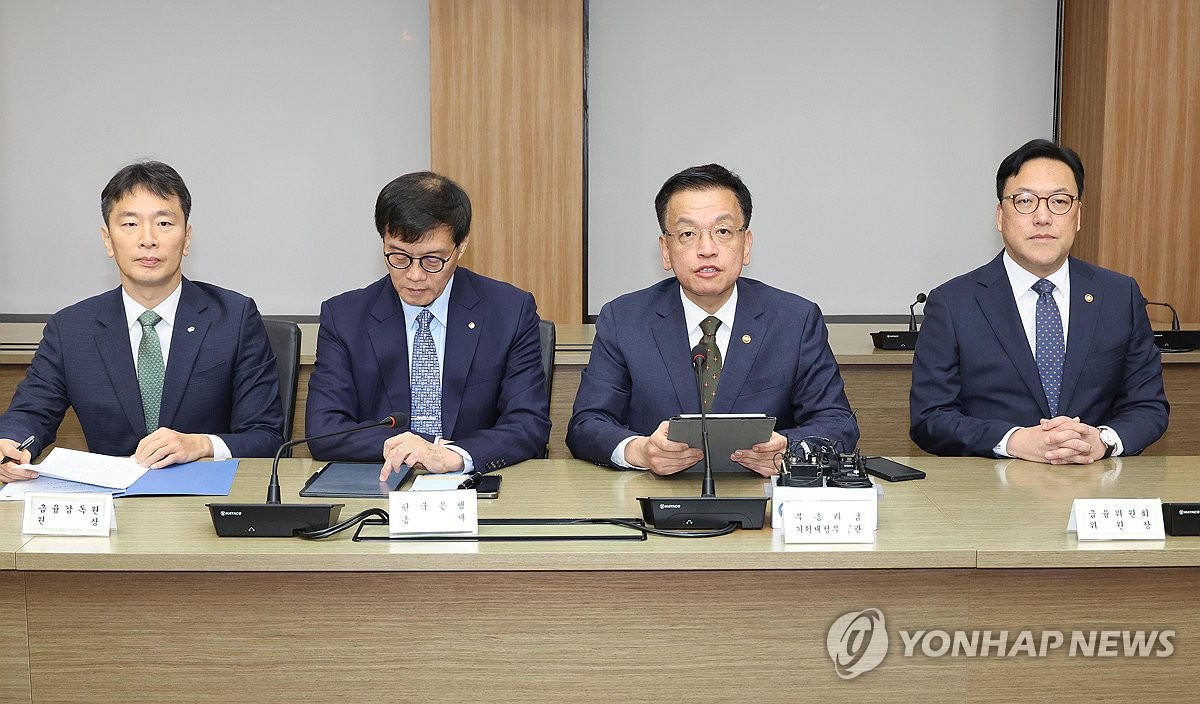Gov't to focus on strengthening risk management amid increased market volatility
By Kim Han-joo
SEOUL, Nov. 8 (Yonhap) -- Finance Minister Choi Sang-mok said Friday the government will strengthen risk management efforts in response to potential increases in market volatility, driven by the U.S. presidential election and interest rate cuts by the Federal Reserve.
The global financial market faces increasing risks following former U.S. President Donald Trump's victory for a second term, which has pushed the U.S. dollar and bond yields to multimonth highs.
Additionally, the U.S. Federal Reserve lowered its benchmark interest rate by a quarter-percentage point earlier in the day, marking the second consecutive reduction following a significant 50-basis-point cut in September.
"Global financial markets have generally stabilized this morning as this decision (U.S. rate cut) was in line with expectations, and the initial impact of the U.S. election results has lessened," Choi said in a meeting with other economic policymakers in Seoul.
However, he warned that market volatility could still increase due to stronger protectionist measures, as advocated by Trump during his campaign, along with ongoing geopolitical risks in the Middle East and the prolonged war in Ukraine.
"With heightened vigilance, the government will work closely with relevant agencies to thoroughly manage these risks," the finance chief said.
Choi said the government is further prepared to implement a step-by-step contingency plan to address excessive market volatility if necessary.
Additionally, the government plans to expand and restructure its 24-hour joint monitoring system, previously focused on the situation in the Middle East, to include the financial and foreign exchange markets.
The government will also monitor potential risks in vulnerable areas, such as household debt and related markets, which could pose additional economic challenges.
"If the housing market overheats or household debt rises rapidly, we will take bold and timely actions to implement additional management measures," Choi said.
The minister also mentioned plans to prepare response strategies for changes in the global trade environment by holding a relevant ministerial meeting in November to explore ways to enhance competitiveness in key industries.
South Korea, which relies heavily on trade for economic growth, could face economic challenges if Trump proceeds with plans to impose across-the-board tariffs on all foreign-made goods entering the country.

Finance Minister Choi Sang-mok (2nd from R), who doubles as the deputy prime minister for economic affairs, speaks during a meeting with other economic policymakers in Seoul on Nov. 8, 2024. (Pool photo) (Yonhap)
khj@yna.co.kr
(END)
-
Prosecution drops charges against Chinese woman for attempting to trespass on BTS Jungkook's home
-
Prince Group stashes away over 90 bln won at Cambodian branches of S. Korean banks: lawmaker
-
S. Korea calls in Vietnamese defense attache over alleged sexual misconduct
-
(Movie Review) 'The First Ride' buckles up for more than joyride
-
Defense chief says Osan Air Base raid did not require U.S. consultations
-
Prosecution drops charges against Chinese woman for attempting to trespass on BTS Jungkook's home
-
Prince Group stashes away over 90 bln won at Cambodian branches of S. Korean banks: lawmaker
-
S. Korea calls in Vietnamese defense attache over alleged sexual misconduct
-
(5th LD) 64 nationals detained in Cambodia over alleged online scams return home, face probes
-
(Movie Review) 'The First Ride' buckles up for more than joyride
-
Prosecution drops charges against Chinese woman for attempting to trespass on BTS Jungkook's home
-
(2nd LD) N. Korea says it tested 2 hypersonic projectiles, successfully hit target
-
(LEAD) Lee welcomes Trump's role as 'peacemaker,' brushes aside U.S. trade concerns: CNN
-
Around 20 N. Korean soldiers briefly cross MDL, retreat after warning shots
-
(2nd LD) Trump to hold bilateral talks with Lee, Xi in S. Korea next week: White House
